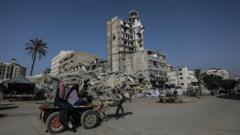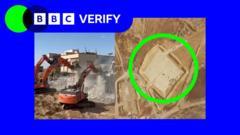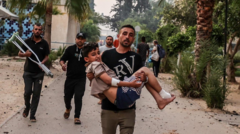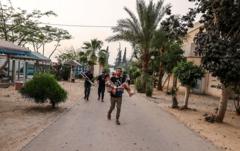Israeli airstrikes on Gaza have reportedly killed at least 80 individuals, including many women and children, as international actors call for urgent humanitarian interventions and a reassessment of the ongoing military operations.
Rising Casualties: Israeli Strikes Claim 80 Lives in Gaza
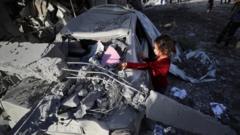
Rising Casualties: Israeli Strikes Claim 80 Lives in Gaza
Escalating violence in Gaza results in significant loss of life, drawing condemnation from UN officials and raising humanitarian concerns.
At least 80 people have died in recent Israeli airstrikes across Gaza, according to local hospitals and emergency responders. The Indonesian hospital reported that 22 children and 15 women were among the victims in the northern Jabalia area, where several homes were hit overnight. In addition, al-Awda hospital documented nine more deaths, including seven children. The Israeli Defense Forces stated the strikes targeted Hamas and Palestinian Islamic Jihad militants, following their warning for residents to evacuate after rocket launches into Israel.
The escalation led to condemnation from Tom Fletcher, the UN's humanitarian chief, who urged the UN Security Council to act against what he described as conditions amounting to genocide in Gaza. Fletcher criticized Israel for imposing harsh conditions on civilians and rejected the Israeli-US initiative for privately distributing humanitarian aid as a ploy for continuing violence against Palestinians. Israel's UN representative, Danny Danon, countered, labeling these accusations as unfounded and asserting that existing aid distribution mechanisms were being exploited by Hamas for military operations.
Eyewitness accounts from Jabalia painted a harrowing picture, with reports of multiple explosions throughout the night and rescue efforts hampered by shortages of medical supplies and electricity at local hospitals. Videos shared showed bodies being brought into the Indonesian hospital, while survivors described scenes of devastation and loss.
The Israeli military reinforced its stance by issuing new evacuation orders for several neighborhoods in Gaza City, asserting that operations would target areas associated with Hamas activities. The armed group, designated as a terrorist organization by various nations, responded to the aerial operations by launching rockets into Israel, heightening the cycle of retaliation.
International observers noted the rising humanitarian crisis in Gaza, where ongoing military operations have displaced a significant portion of the population. As of now, over 20% of Gaza's 2.1 million residents face severe food shortages, worsening their plight amid the escalating conflict.
The ongoing violence was exacerbated following the collapse of a temporary ceasefire earlier this month, with recent analysis revealing high levels of acute food insecurity affecting the population. Many UN-supported community kitchens have ceased operations due to shortages of essential resources, echoing the call for Israel to comply with international humanitarian law, which mandates the provision of food and medical supplies to civilian populations in conflict zones.
Meanwhile, hopes have emerged for a potential ceasefire following Hamas's release of a living Israeli-American hostage, which some speculate could initiate new negotiations. US President Donald Trump expressed optimism for the release of additional hostages, aligning with broader diplomatic efforts in the region.
Israeli Prime Minister Benjamin Netanyahu remains adamant in pursuing an intensified military campaign against Hamas, pledging not to halt operations until the group's capabilities are fully dismantled. Tensions remain high, and the humanitarian crisis continues to unfold amidst the backdrop of ongoing aerial assaults, raising urgent calls for diplomatic intervention.






